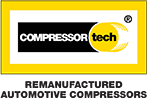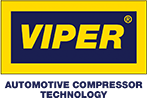



















The Origins of Air Conditioning
Honeywell (NYSE: HON) and DuPont (NYSE: DD) today announced a manufacturing joint venture to produce a new refrigerant for use in automotive air conditioning systems. The new refrigerant has 99.7 percent lower global warming potential (GWP) than the current refrigerant.
Under the agreement, DuPont and Honeywell will share financial and technological resources with the intent to jointly design, construct and operate a world-scale manufacturing facility for the new refrigerant, known as HFO-1234yf. The product meets European Union regulatory requirements for lower GWP refrigerants for automobile air conditioning systems. DuPont and Honeywell developed the product jointly but will market and sell it separately.
"Through this manufacturing partnership, Honeywell and DuPont will deliver to the automobile industry this environmentally preferable solution that meets both operational and regulatory requirements. Globally, consumers will benefit from this new technology, which reduces greenhouse gas emissions," said Terrence Hahn, vice president and general manager for Honeywell's Fluorine Products business. "This complements Honeywell's significant energy efficiency and environmental solutions portfolio, which is positioned to deliver efficiency advantages to a wide array of industries while benefiting the environment."
"The new refrigerant enables the automotive industry to reduce the environmental footprint of vehicles at significantly lower cost than alternatives," said Gary W. Spitzer, president – DuPont Chemicals & Fluoroproducts. "By working together with Honeywell, DuPont is confident we'll have the winning combination to enable the industry to realize environmental benefits sooner. DuPont's role in the introduction of HFO-1234yf is another great example of the innovation DuPont has brought to the automotive industry for nearly a century."
This venture follows an earlier joint development agreement under which the two companies developed the product. The joint venture announced today is designed to provide DuPont and Honeywell with a world-class source of supply to meet the growing demand faster than would be possible through either company's individual efforts.
Today's automotive air conditioners use hydrofluorocarbon HFC-134a, which has a GWP of 1430. The European Union's Mobile Air Conditioning Directive requires that, starting in 2011, all new vehicle models use a refrigerant with a GWP below 150, and by 2017, all new automobiles sold in Europe will be required to use a low-GWP refrigerant. The new refrigerant, developed by DuPont and Honeywell, has a GWP of 4, which is 97 percent less GWP than the new regulation requires.
Prior to construction of a world-scale plant, the joint venture will begin supplying the refrigerant in the fourth quarter of 2011 in time to meet the European Union regulatory requirement.
Honeywell and DuPont introduced HFO-1234YF to the automotive industry in 2007, and since then, it has undergone extensive testing for safety and efficacy by independent testing groups such as the SAE International Cooperative Research Program, in which leading automakers participate.
The SAE testing found the product offers environmental performance superior to carbon dioxide, an alternative refrigerant, while having "the lowest risk for use in mobile air conditioning systems in meeting environmental and consumer needs."
According to industry estimates, there are more than 400 million cars with air conditioning systems globally, with each system using between one half and one kilogram of refrigerant. Air conditioning systems using HFO-1234yf, developed by DuPont and Honeywell, are more energy efficient than carbon dioxide-based air conditioning systems, particularly at high ambient temperature conditions.
Honeywell International is a Fortune 100 diversified technology and manufacturing leader, serving customers worldwide with aerospace products and services; control technologies for buildings, homes and industry; automotive products; turbochargers; and specialty materials. Based in Morris Township, N.J., Honeywell's shares are traded on the New York, London, and Chicago Stock Exchanges.
Honeywell Specialty Materials is a global leader in providing customers with high-performance specialty materials, including fluorine products; specialty films and additives; advanced fibers and composites; intermediates; specialty chemicals; electronic materials and chemicals; and technologies and materials for petroleum refining.
DuPont – one of the first companies to publicly establish environmental goals 20 years ago – has broadened its sustainability commitments beyond internal footprint reduction to include market-driven targets for both revenue and research and development investment. The goals are tied directly to business growth, specifically to the development of safer and environmentally improved new products for key global markets.
DuPont is a science-based products and services company. Founded in 1802, DuPont puts science to work by creating sustainable solutions essential to a better, safer, healthier life for people everywhere. Operating in approximately 80 countries, DuPont offers a wide range of innovative products and services for markets including agriculture and food; building and construction; communications; and transportation.
This release contains certain statements that may be deemed "forward-looking statements" within the meaning of Section 21E of the Securities Exchange Act of 1934. All statements, other than statements of historical fact, that address activities, events or developments that we or our management intends, expects, projects, believes or anticipates will or may occur in the future are forward-looking statements. Such statements are based upon certain assumptions and assessments made by our management in light of their experience and their perception of historical trends, current economic and industry conditions, expected future developments and other factors they believe to be appropriate. The forward-looking statements included in this release are also subject to a number of material risks and uncertainties, including but not limited to economic, competitive, governmental, and technological factors affecting our operations, markets, products, services and prices. Such forward-looking statements are not guarantees of future performance, and actual results, developments and business decisions may differ from those envisaged by such forward-looking statements.
 |
|
||||
 |
|
||||
 |
|
||||
 |
|
||||
 |
|
||||
 |
|
||||
 |
|
||||
 |
|
||||
 |
|||||

